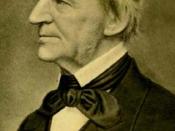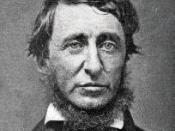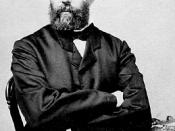Transcendentalism is a literary, religious, and philosophical movement originating in New England in the mid-1830s and remaining influential until the 1860s. The philosophy behind transcendentalism was an eclectic mix of English romanticism (especially as mediated by William Wordsworth, Samuel Taylor Coleridge, and Thomas Carlyle), antirationality, antipuritanism, the mysticism of Emanuel Swedenborg, and aspects of Eastern philosophies. The term "transcendentalism," which was actually coined by those who ridiculed the movement for its dreamy abstractions, derives from the German philosopher Immanuel Kant, who wrote of the need to transcend reason alone for a true understanding of reality.
Transcendentalism is operated with the sense that a new era was at hand. They were critics of their contemporary society for its unthinking conformity, and urged that each person find, in Emerson's words, "an original relation to the universe" . Emerson and Thoreau sought this relation in solitude amidst nature, and in their writing. By the 1840s they, along with other transcendentalists, were engaged in the social experiments of Brook Farm, Fruitlands, and Walden; and, by the 1850s in an increasingly urgent critique of American slavery.
The central beliefs of transcendentalism were in unity between nature and God, the presence of God in each individual, and the potential perfectibility of humans. These core beliefs generated others, particularly in individualism and in the self-reliance extolled by Ralph Waldo Emerson, who wrote that "nothing is at last sacred but the integrity of your own mind." Although transcendentalism was criticized for its supposed otherworldliness, it did have a strong practical element, evident in the formation of the utopian community of Brook Farm, in its anti-institutionalism, and in the dedication of many of its members to social reform. Writers who were either transcendentalists or closely associated with the movement include Bronson Alcott (1799-1888), Emerson, Margaret Fuller (1810-50), and...


